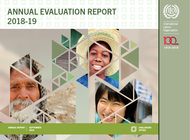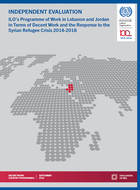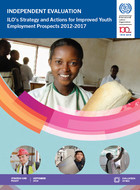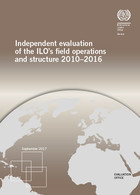Evaluation reports
2019
-

Annual evaluation report 2018-19
07 October 2019
This year in review reflects on the progress made in implementing 19 biennial milestones, as measured against the ILO’s evaluation strategy 2018-21. The report also assesses the ILO’s effectiveness and results.
-

Independent high-level evaluation of the ILO’s programme of work in four selected member countries of the Southern African Development Community (SADC) (Lesotho, Madagascar, South Africa and the United Republic of Tanzania) 2014–18
01 October 2019
2018
-

Annual evaluation report 2017-18 (Long Report)
22 October 2018
This year in review reflects on the progress made in implementing the ILO's new evaluation strategy (2018), as measured against its three outcomes: (1) Enhanced capacities and systems of evaluation for better practice and use; (2) Enhanced value of evaluation through the use of more credible and higher quality evaluations (independence, crediblity and usefuleness); and (3) Stronger knowledge base of evaluation findings and recommendations. It also reviews approaches towards assessing the ILO's overall effectiveness.
-

Quick Facts - Annual Evaluation Report 2017-2018
12 October 2018
This short two-pager presents a visual set of quick facts that summarizes the Annual Evaluation Report 2017-2018
-

Independent evaluation of ILO’s capacity development efforts 2010-2017
11 October 2018
This high level evaluation reviewed the ILO's support for capacity development of its constituents from 2010 to 2017. It reviewed interventions that intended to deliver capacity development with a focus on the difference it made to constituents. The evaluation is expected to inform the capacity development strategy to give effect to the 2016 resolution on Social Justice Declaration, due in March 2019.
-

Independent evaluation of ILO’s programme of work in Lebanon and Jordan in Terms of Decent Work and the Response to the Syrian Refugee Crisis, 2014-2018
11 October 2018
This high-level evaluation evaluation examines the ILO’s work in Lebanon and Jordan. The main purpose of the evaluation is to validate the achievement of results and the ILO’s contribution towards national development objectives, decent work, and the response to the Syrian refugee crisis from 2014-18. The evaluation assessed their relevance to country needs, coherence and validity, effectiveness and efficiency, the impact of the results and the potential for sustainability.
-

Independent evaluation of the ILO’s strategy and actions for improved youth employment prospects, 2012–2017
11 October 2018
This high-level evaluation assesses the ILO’s strategy and actions for improving youth employment prospects. The evaluation is informed by the organization's long history of work in youth employment. The evaluation takes into consideration all efforts undertaken by the office from 2012 to 2017 in order to provide insight into the relevance, coherence, effectiveness, efficiency, impact and sustainability of its work in this area in order to inform future policy and decision-making processes.
-
Support the reintegration of returnees in Ethiopia - Midterm Independent Evaluation - Final evaluation summary
29 March 2018
Project Code: ETH/15/01/EEC - Evaluation consultants: Seetharam Mukkavilli (Team leader) and Kifle A. Wondemu (Team member)
-
Outcome evaluation of MMR801, Strengthened capacity of employers' organizations a - Final evaluation
21 February 2018
Project Code: MMR/14/01/RBS & MMR/16/02/RBS - Evaluation consultants: David Irwin & Min Min Han
-
Skills for local economic development (SKILLED) in Sri Lanka - Final evaluation
11 January 2018
Project Code: SRL/12/01/EEC - Evaluation consultant: Sandy Wark
2017
-
Strengthening the impact on employment of sector and trade policies - Midterm Evaluation
13 December 2017
Project Code: GLO/14/37/EEC- Evaluation consultants: Maria Zarraga & Claude Hilfiker, Forwaves Consulting
-
Development of a tripartite framework for Ethiopian and Somali women domestic migrant workers to the GCC states, Lebanon and Sudan - Final Evaluation
13 December 2017
Project Code: RAF/12/09/EEC - Evaluation consultants: Mei Zegers
-
Partnerships for youth employment in the Commonwealth of Independent States (CIS) - Final cluster evaluation summary
13 December 2017
Project Code: RER/12/01/LUK- Evaluation consultants: Tony Powers
-
Better Work Lesotho, Better Work Nicaragua, Better Work Haiti - Final cluster evaluation summary
12 December 2017
Project Code: LES/14/52/USA; LES/12/01/USA; LES/11/50/USA; NIC/15/01/USA; HAI/12/01/USA; HAI/12/51/USA - Evaluation consultants: Rafael Muñoz Sevilla, Carolina del Campo Vara
-
Global Action Program (GAP) on child labour issues - Final evaluation Summary
01 December 2017
Project Code: GLO/11/11/USA - Evaluation consultants: Smita Premchander (team leader), Clara Ariza
-
Eliminating child labour in El Salvador through economic empowerment and social inclusion – Final Evaluation Summary
03 November 2017
Project Code: ELS/10/50/USA - Evaluation consultants: Mauricio García Moreno (team leader) and Silvia Rubio (team member)
-
Promoting gender equality for decent employment in Pakistan - Final Evaluation Summary
01 November 2017
Project Code: PAK/09/03/CAN - Evaluation consultants: Francisco L Guzman (lead evaluator), Adeela K Zubair (national consultant), Nuria Moya (evaluation assistant)
-
PROMOTE: Decent work for domestic workers to end child domestic work - Final Joint Independent Evaluation Summary
01 November 2017
Project Code: INS/12/12/USA - Evaluation consultants: Ruth Bowen (ILO consultant) and Mei Zegers (USDOL consultant)
-
Improving indigenous peoples’ access to justice and development through strategic monitoring- Final Evaluation Summary
30 October 2017
Project Code: GLO/14/04/EEC - Evaluation consultant: Mr. Tony Powers
-

Independent evaluation of the ILO’s field operations and structure 2010–2016
25 October 2017
This high-level evaluation assesses the performance of the ILO's field operations and structure, given the Decent Work Agenda in particular but also the 2030 Agenda, and ongoing reform in the UN development system in view of the Sustainable Development Goals. The evaluation identifies recommendations for improving the ILO’s field structure and operations and reflects on lessons learned and emerging good practices.